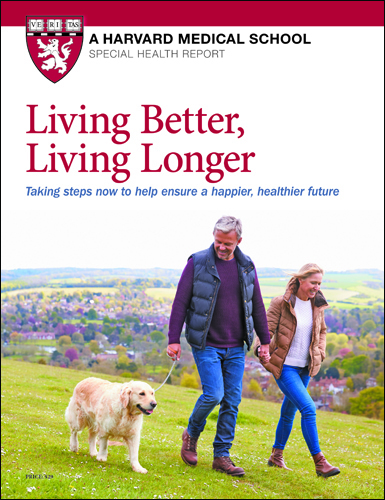Want a longer, happier life? Consider using apps
The path to improved well-being may start with a high-tech tool.
- Reviewed by Anthony L. Komaroff, MD, Editor in Chief, Harvard Health Letter; Editorial Advisory Board Member, Harvard Health Publishing

Emotional well-being is important for our health: it strengthens our immune system, speeds recovery from health problems, and reduces the risks of chronic disease. So it's probably no surprise that emotional well-being seems to contribute to living longer. It's linked to a 20% lower risk of premature death from all causes among healthy people.
Why might feelings of contentment, happiness, satisfaction with life, optimism, and fulfillment have health perks? They help counteract the effects of life's negative emotions and stresses. "If you're plagued by negative thoughts, depression, anxiety, and fears, it pounds you daily. Your immune response drops, and your body is in a constant state of stress, which is associated with chronic inflammation, chronic disease, and premature death," says Nancy Etcoff, a happiness psychologist and assistant professor of medicine at Harvard Medical School.
Finding ways to enhance your well-being can be challenging. Fortunately, guidance is just a few clicks away.
Health-related apps
More than 350,000 apps — programs that run on your computer, tablet, smartphone, or wearable tech (such as smartwatches) — are geared toward consumer health. They aim to help with everything from managing chronic disease or medication regimens to providing instruction and motivation to maintain healthy lifestyle habits or activities. Many of those activities can improve your well-being.
We don't have conclusive evidence that the use of such apps in itself boosts your well-being. But it could help you on your journey. "When you use an app that promotes well-being, it means you're open to change. It's a good starting point," Etcoff says.
Apps for well-being
Apps that support emotional well-being include those that focus on any of the following activities.
Cultivating happiness and gratitude. Research suggests that 40% of your happiness is under your control. Happiness apps often include affirmations, meditations, and suggestions for activities that promote happiness — such as keeping a gratitude journal, performing acts of kindness, or getting better sleep, which are all associated with improved mood.
Exercising. Moderate-intensity exercise, such as brisk walking, helps manage stress and decrease depression and anxiety. Exercise apps often track the number of steps you take and the number of minutes you're moving each day. They may also provide complete workouts with exercises, videos, or even live classes that you can follow at home.
Meditating. Meditation elicits the relaxation response, a calming meditative state that lowers blood pressure, heart rate, breathing rate, oxygen consumption, and levels of adrenaline and the stress hormone cortisol. You can find apps to guide you through many kinds of meditation, such as mindfulness (which focuses on awareness of the present moment), guided imagery, yoga, or transcendental meditation (in which you use a repeated sound or phrase to help you empty your mind).
Getting more sleep. Sleep deprivation is associated with depression, anxiety, and many other health problems. Sleep apps help you track how long you sleep and offer tips on improving sleep hygiene, such as going to sleep and waking up at the same time each day, and avoiding food and drinks at certain times.
Can artificial intelligence guide well-being?New evidence suggests that a particular model of artificial intelligence (AI) holds promise for predicting and guiding a person's future well-being. The research, published online June 20, 2022, by Aging, was led by a company called Deep Longevity and Harvard scientist Dr. Nancy Etcoff. The AI model used in the study, called FuturSelf, is free and already online (https://futurself.ai). You simply answer few questions, and the AI sends back suggestions. "It assesses areas where you need help. Maybe you're depressed, not exercising, not socializing, or not going to the doctor enough. You can see what's bothering you and decide if you want to make tweaks in your life," Etcoff says. "This may be one direction where self-help is headed." |
Finding apps for well-being
To find apps that promote well-being, look for approaches that appeal to you and are free (or offer a free trial period), have good reviews, don't collect too much information from you, and are popular — with hundreds of thousands or millions of downloads. For example, apps called Sleep Cycle: Sleep Tracker and Better Sleep each have more than 10 million downloads.
Other popular apps include Calm, Insight Timer, and Headspace for meditation; Nike Training Club: Fitness or Adidas Training: Home Workout for exercising; and Presently or Three Good Things to maintain a gratitude journal.
Image: © Simona Pilolla/Getty Images
About the Author

Heidi Godman, Executive Editor, Harvard Health Letter
About the Reviewer

Anthony L. Komaroff, MD, Editor in Chief, Harvard Health Letter; Editorial Advisory Board Member, Harvard Health Publishing
Disclaimer:
As a service to our readers, Harvard Health Publishing provides access to our library of archived content. Please note the date of last review or update on all articles.
No content on this site, regardless of date, should ever be used as a substitute for direct medical advice from your doctor or other qualified clinician.
















